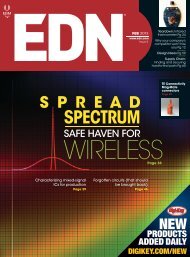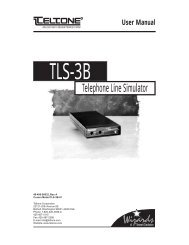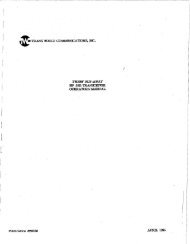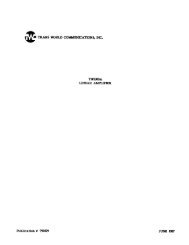20090528 c20090515 [60].pdf 18192KB May 29 2009 05:10:11 PM
20090528 c20090515 [60].pdf 18192KB May 29 2009 05:10:11 PM
20090528 c20090515 [60].pdf 18192KB May 29 2009 05:10:11 PM
You also want an ePaper? Increase the reach of your titles
YUMPU automatically turns print PDFs into web optimized ePapers that Google loves.
pulse<br />
EDITED BY FRAN GRANVILLE<br />
INNOVATIONS & INNOVATORS<br />
Free ac/dc digital-power reference<br />
design has universal input and PFC<br />
You can download free design files and control-software<br />
code for this reference design.<br />
Microchip Technology based its new ac/<br />
dc reference design on the dsPIC33F<br />
GS series of digital-power DSCs (digital-signal<br />
controllers). The unit works with a<br />
universal input-voltage range and produces<br />
three output voltages. The ac input can range<br />
from 85 to 265V, and frequencies range from<br />
45 to 65 Hz; continuous-power-output rating is<br />
300W. A front-end PFC (power-factor-correction)-boost<br />
circuit converts universal ac-input<br />
voltages to a 420V-dc bus voltage. Inputpower<br />
factor is greater than 0.98. An isolated<br />
buck converter uses the 420V PFC bus to create<br />
a 12V, 30A intermediate bus. The converter<br />
uses a ZVT (zero-voltage-transition) circuit to<br />
reduce losses, increase efficiency, and reduce<br />
stress on the power MOSFETs. The 12V bus<br />
then feeds a multiphase synchronous buck<br />
converter that can produce 69A at 3.3V. The<br />
12V bus also feeds a single-phase buck converter<br />
that produces 23A at 5V.<br />
The reference design has one four-layer<br />
board for digital signals and another for the<br />
other power stages. The design features softstart<br />
capability and synchronous rectification.<br />
One dsPIC33F digital-power IC handles the<br />
PFC and primary-side ZVT-bridge control, and<br />
a second chip controls the converter stages.<br />
You can download free documentation,<br />
including software and Gerber files, at www.<br />
microchip.com/smps. For an expanded version<br />
of this write-up, go to www.edn.com/article/<br />
CA6651496.—by Paul Rako<br />
Microchip Technology, www.microchip.<br />
com.<br />
FEEDBACK LOOP<br />
“I love these<br />
stories; please<br />
don’t stop! As<br />
tough as errors<br />
and problems<br />
can sometimes<br />
be, they offer<br />
themselves as<br />
challenging<br />
learning opportunities<br />
nonetheless.”<br />
—Engineer and EDN reader<br />
C Kaspereli, in EDN’s Feedback<br />
Loop, at www.edn.com/article/<br />
CA6648806. Add your<br />
comments.<br />
DSP combines fixed- and floating-point operation<br />
Texas Instruments’ TMS320C6743 low-power DSP features both<br />
high-precision, wide-dynamic-range, floating-point operations and<br />
higher-performance, lower-power, fixed-point operations. The<br />
C674x core uses a superset of the fixed-point C64x and the<br />
floating-point C67x instruction sets. The operations support a<br />
wider dynamic range than do fixed-point operations.<br />
The C6743 includes 192 kbytes of on-chip memory and consumes<br />
490 mW in operating mode and <strong>60</strong> mW in standby mode.<br />
Peripheral support includes a <strong>10</strong>/<strong>10</strong>0-Mbps Ethernet MAC<br />
(media-access controller) with a management-data I/O module;<br />
a multimedia-card/secure-digital peripheral; enhanced, high-resolution<br />
PWM (pulse-width modulation); 32-bit enhanced quadrature-pulse<br />
peripherals; and two external-memory interfaces—one<br />
for slower, asynchronous memories and the other for SDRAM.<br />
The C6743 is object-code-compatible with all TMS320C<strong>60</strong>00<br />
devices; it is scalable and pin-to-pin compatible with C674x and<br />
OMAP (Open Multimedia Applications Platform)-L137 devices. It<br />
is available for sampling now and costs $7.85 (<strong>10</strong>00). The OMAP-<br />
L1x/C674x starter kit, TMDXOSKL137BET, which is available for<br />
$395, includes a board-specific Code Composer Studio IDE (integrated<br />
development environment) and supports DSP/BIOS kernels.<br />
For an expanded version of this write-up, go to www.edn.<br />
com/article/CA6653671.—by Robert Cravotta<br />
Texas Instruments, www.ti.com/c6743dsp.<br />
12 EDN | MAY 28, <strong>2009</strong>


![20090528 c20090515 [60].pdf 18192KB May 29 2009 05:10:11 PM](https://img.yumpu.com/39836063/13/500x640/20090528-c20090515-60pdf-18192kb-may-29-2009-051011-pm.jpg)

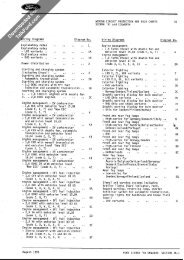
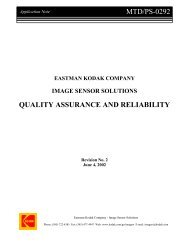
![[270].pdf 37407KB Sep 02 2010 09:55:57 AM - ElectronicsAndBooks](https://img.yumpu.com/50350834/1/185x260/270pdf-37407kb-sep-02-2010-095557-am-electronicsandbooks.jpg?quality=85)
![draaien, A Viruly 1935 OCR c20130324 [320]. - ElectronicsAndBooks](https://img.yumpu.com/49957773/1/190x252/draaien-a-viruly-1935-ocr-c20130324-320-electronicsandbooks.jpg?quality=85)

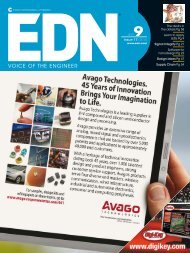

![20051110 c20051031 [105].pdf 35001KB Feb 18 2009 08:46:32 PM](https://img.yumpu.com/48687202/1/190x253/20051110-c20051031-105pdf-35001kb-feb-18-2009-084632-pm.jpg?quality=85)
